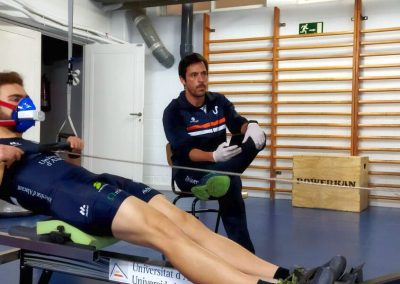Crystal OKeefe: Welcome to the MetPro Method. I’m your host, Crystal O’Keefe, and today I am joined by sports dietitian and lead MetPro coach, Amber Velasquez. Today we are going to be discussing creatine. Amber, thank you so much for being here today. I am super excited for this discussion.
Amber Velasquez: Thanks so much for having me back, Crystal. I’m super excited as well.
Crystal OKeefe: Well, I, we probably should have hit record like 10 minutes ago because we went down a whole rabbit hole of interesting discussion. But for the listeners, a couple of weeks ago, we had a discussion amongst us coaches and, and Amber was one of the coaches explaining some of the things around creatine.
And I feel like it’s fascinating how many myths exist around creatine. So, can we just start with what exactly is creatine? Because I hear a lot of people saying things like, it’s a steroid.
Amber Velasquez: Absolutely. So creatine is definitely not a steroid. Its structural components are nothing like a steroid. It’s actually a type of amino acid that comes from protein, and it provides energy to your muscles. You’ll actually find creatine naturally in your body, but it’s also one of the most studied supplements out there.
So, nothing like a steroid. It’s natural in your body. So, there’s that.
Crystal OKeefe: Phew. Okay. Now that we’ve got that out of the way, it’s not bad to take creatine. Um, I mean, it’s not illegal
Amber Velasquez: Not at all.
Crystal OKeefe: Are there any other things before we kind of talk through like who should take it, who should not take it, anything else we need to know about creatine kind of at a base level?
Amber Velasquez: Yeah, I mean, a couple of little things. So our body does naturally produce it, but it only produces about one gram per day. And so when you actually look at how much your body really needs, that’s a very minuscule amount. And so supplementation can actually be really helpful. And it’s the most well-studied supplement.
So there’s a lot of evidence that supports using it, the safety, the effectiveness. It’s important to choose a quality brand, but overall it’s a very safe supplement to use and there’s a lot of good benefits that can come from it.
Crystal OKeefe: Okay, so, are there certain people who should be taking it or who should be avoiding creatine? Are there any of those kind of guidelines we might have?
Amber Velasquez: Yeah, good question. So I would say anybody that’s doing at least two strength training sessions a week and they’re looking to increase their lean muscle mass, build some strength, improve their overall performance or even just improve their recovery time. They could really benefit from taking creatine.
Our vegans and vegetarians could also really benefit just because a lot of their protein sources are not animal proteins, and that’s where creatine comes from in our natural food sources. For people that shouldn’t take creatine, I would say anyone with any underlying kidney disease or disorder, um, Anyone that has an issue with their blood pressure and then heart disease or anyone with a disease called rhabdomyolysis, which is a disease that causes muscle tissue breakdown and kidney failure.
So anything that has to do with blood pressure or kidneys, I would stay clear of creatine unless you get cleared by your doctor. So any, anytime you start a new supplement, if you have underlying conditions, always talk with your doctor first.
Crystal OKeefe: Yeah, definitely good advice. Okay, so, you mentioned that there, it’s been studied a lot, but what exactly are the benefits of creatine? You said something about lean muscle mass building in there, so I’m thinking that’s a benefit.
Amber Velasquez: Yes, that’s one of the main benefits. Um, so the evidence supports its role in increasing lean muscle mass. It can help you build strength. It’ll improve your overall performance. Um, especially if you’re like sports specific, um, or even just if you’re working out and you want to get stronger and faster and build those muscles.
It also helps with your recovery time. And that’s where a lot of people struggle when it comes to weight training. They get sore and this can help prevent some of that soreness from happening and get you recovered much quicker and back to strength training. Um, there’s also some evidence that supports improvements in your cognitive function and maintaining your lean muscle mass in the older population, but more and more studies are coming out with that.
So we’re not gonna. Dig too deep into that section.
Crystal OKeefe: Okay, we’ll put a little asterisk by that. Okay, are, are there any drawbacks from taking creatine that we should be aware of?
Amber Velasquez: I would say the only drawbacks that you might see is a little bit of bloating, maybe some water retention, but that usually resides within the first week or so of using creatine. Um, and that water retention really just comes from your muscles pulling all of that water and creatine in. So you’re going to feel that fullness for a couple of days, but then it starts to subside as long as you’re hydrating well and continuing your workouts and taking it consistently.
Crystal OKeefe: Okay.
Amber Velasquez: The biggest thing is creatine has to be taken consistently for your muscles to really absorb and reap all the benefits from it.
Crystal OKeefe: I think we should probably add in here that if you’re working with a MetPro concierge coach or any other kind of dietician, you might want to let them know that you’re taking creatine as well, so that if any changes happen to your weight, then we know why, because you just said there’s going to have some of that water drawing into your muscles.
That’s going to see a weight increase, correct?
Amber Velasquez: Absolutely. We could see a weight increase. And so it’s really important to let your coach know if you’re working with us at MetPro because we don’t want to make too many changes at one time. We don’t know if increasing your carb intake is what caused the weight increase or is it the creatine? So it’s really important that we can find a stable phase for you to stay on while starting creatine and give you that time to adapt to it.
Crystal OKeefe: Okay, that makes sense. I want to dive into the myths, but I think first we should talk about when you start taking creatine, I always hear that there’s this loading phase. How does that work?
Amber Velasquez: Yeah, very good question. A lot of people do this, but it’s not necessary. The loading phase is where you start out your first couple of days, usually three to seven days. You’ll take four to five times that actual dosage size. So it’ll be around 20 to 25 grams per day for the first couple days. And then after that, you taper back down to the regular five grams per day, which is the general dosage.
Um, and what this is supposed to do is it’s supposed to Kind of intensify the effects of the creatine being pulled into the muscles rapidly within that first week and then your muscles are already kind of adapted to it. So then when you drop to the five grams per day, your muscles have already started pulling in that creatine more frequently.
And supposedly the benefits happen a little bit quicker when you do the loading phase.
Crystal OKeefe: Okay. All right. And what about those myths? Have you, have you heard other myths besides things like it’s a steroid? Have you heard them yourself?
Amber Velasquez: I hear creatine myths all the time. Usually, anytime I have a client ask about it, they usually have myths. Coming to me to ask about it. And so a couple of my favorites, um, is that one, you have to do a dumping phase and that’s not true. You’ll still see the benefits. It may take a little bit longer, but as long as you’re using creatine consistently and taking it daily, like your multivitamin, you’re going to see those results.
Crystal OKeefe: Okay.
Amber Velasquez: And as long as you’re doing strength training too. It doesn’t necessarily work for endurance-only athletes. Um, so just make sure that if you’re lifting, you’re taking it consistently. And then another myth that I love is that you’ll lose your muscle mass if you stop taking it. And that is absolutely not true.
You may notice that your muscles get a little bit smaller. initially when you stop taking it, but that’s because the water is all coming out. You’re not, your muscles aren’t pulling in as much water as they do when you’re on creatine. So your muscle mass does not go away, but the water weight and the water retention in your muscles might decrease.
Crystal OKeefe: Okay, okay. Wow, I wonder why there are so many myths around creatine. It’s kind of fascinating.
Amber Velasquez: I would say there’s probably so many myths because there’s so much evidence out there like when I was digging into creatine, I came across an overwhelming amount of research on it. Some of it was a little biased based on supplement companies. Some of it was very reputable. And so it’s really hard to decipher what’s really true and what’s not.
And as you know, there’s so much information on the internet that people, they read it and they believe it. And sometimes it’s not always true.
Crystal OKeefe: Yeah. Yeah, I think sadly that is correct.
Amber Velasquez: Yeah, and if you don’t know, it’s really hard to decipher what’s true and what’s not. So I fully get where those people are coming from.
Crystal OKeefe: Yeah, you know on that note you mentioned earlier that people should make sure to be taking creatine from a reputable source Do you have any? Suggestions or guidelines on how they can make sure that they’re taking creatine from a reputable source.
Amber Velasquez: Absolutely. Um, I will say, look for brands that have been third-party tested. And what this means is that they’ve gone through an outside source. So not only their own testing, but they’ve used an outside company to make sure that what they’re putting on that label is actually what you’re getting in the supplement.
There are a lot of brands out there that will just put a bunch of fillers in. And even though you’re taking five grams of creatine per day, it may only actually have one gram and it’s just filled with some other powder. So you can look for certain labels like the NSF sports-certified label will be on a lot of supplements.
And that just means that it’s certified for sport. College athletes can use it because it doesn’t have banned materials in it. It’s truly what is on the label. And that’s super important because You never know what you’ll be taking if it’s not third-party tested.
Crystal OKeefe: Yeah, supplements, unlike if you were to have supplements are not the same as taking drugs like they’re not required to do the same thing. So that’s why third-party testing is so important to be able to use because they can get a little crazy with those labels, right? I mean, there’s some, I don’t mean to go down a rabbit hole, I just know that when it’s not third-party certified and it’s a supplement. There’s certain wording that can be used that indicates one thing, but it’s not necessarily your expectation. It doesn’t match.
Amber Velasquez: Yep, you’re totally right. They have, they’re not FDA approved, so they can use certain claims that FDA approved items can’t use, and so it’s really misleading and, you know, sometimes they’ll just put a whole bunch of junk in your products and it’s really not beneficial and you’re just wasting your money.
So, reputable brands, are super important, regardless of the supplement that you’re using.
Crystal OKeefe: Well, I’m really glad you brought that up. That’s, that’s something we want to make sure people are, are knowing about. If someone is on MetPro and they’re using creatine, would they need to log it?
Amber Velasquez: So no, you would not need to log it because essentially it would be considered kind of like a free food because it doesn’t contribute to more than 40 calories per serving. Um, but it would be important to let your coach know, as we mentioned earlier, just to make sure that phase changes aren’t happening at the same time.
If you don’t let your coach know, it’s really hard to determine, you know, what’s really causing the weight fluctuations or, you know, your strength increase or anything like that.
Crystal OKeefe: Okay, and, and you also mentioned that one of the benefits of creatine was that, that clearer thinking, uh, cognition. Should a person, if that’s their only benefit in mind, should they be taking creatine or is that part of the studies you were talking about earlier and we don’t know exactly yet?
Amber Velasquez: Yeah, I would say the jury’s still out on that because most of the studies that I came across. The people that did see improvements in their cognitive function were also doing strength training. So it’s really hard to narrow down if they were just taking creatine for those cognitive benefits and how to really track those benefits Um, so I would say if you’re just looking for those Brain improvements or cognitive improvements, you know, look at other supplements and food sources, um, some things like DHA or magnesium, they’ve been shown to help with brain function, um, so I would always start there.
I actually just read an article by Harvard Medical School that stated supplements with claims for brain health don’t actually have evidence of them working, so it might be more of an anecdotal side effect or something else in the person’s lifestyle that changed. So I would say if you’re taking it just for that, I probably would stay clear.
But if you’re strength training, you might actually notice some of those cognitive benefits.
Crystal OKeefe: Okay. That’s great advice. Is there anything else about creatine that we haven’t covered today that you want to make sure listeners know about?
Amber Velasquez: Let’s see. We’ve covered so much. I will say one thing that I know a lot of women especially might be interested if they’re in that menopausal stage in their life. There have been lots of research and evidence that supports us women using that during that stage of our life and even during our menstrual cycles because Our body can only facilitate creatine at certain times of the cycle, so using it consistently can help in those times where our body is not making enough and transferring it to the muscles.
The brain and cognitive functions are true. It can absolutely help with that. And then it’s been shown to help preserve muscle mass in those women that are going through the hormonal changes. Um, so I think women in that stage could really benefit from taking it.
Crystal OKeefe: Okay. That, well, that’s definitely good advice and a relief as a perimenopausal woman, I am all about whatever I can take to help out.
Amber Velasquez: Absolutely. I know that’s a hard stage. I haven’t, I haven’t been there myself yet, but I can only imagine.
Crystal OKeefe: It’s not, it’s not fun, Amber, it’s not fun.
Amber Velasquez: So I hear from a lot of people.
Crystal OKeefe: Well, Amber, thank you so much for your time today. As always, it’s been a pleasure.
Amber Velasquez: Thank you so much for having me, Crystal. I really appreciate it.
Crystal OKeefe: Of course, uh, listeners, that is all for this week. You can find all the MetPro Method episodes anywhere you get podcasts, or you can go to MetPro.co/podcast. Please be sure to follow the show and rate and review which lets other people know what they can expect from the show.
You can also learn more about MetPro@metpro.co. I’m your host, Crystal O’Keefe, and I will be back next week. Until then, remember, consistency is key.





